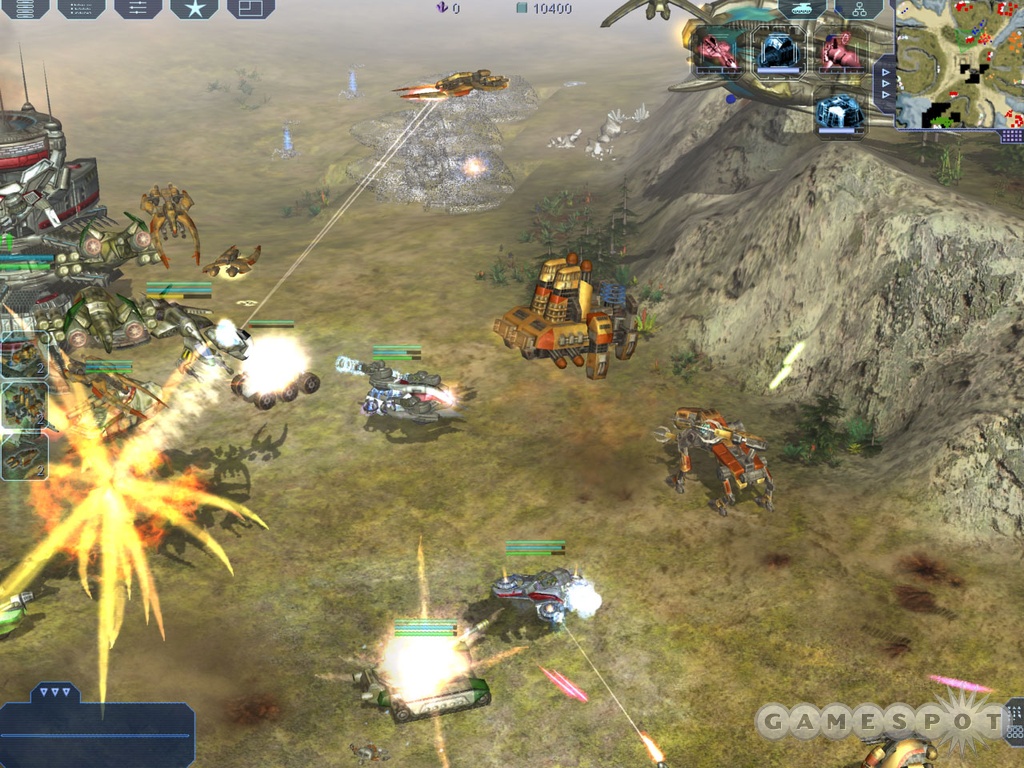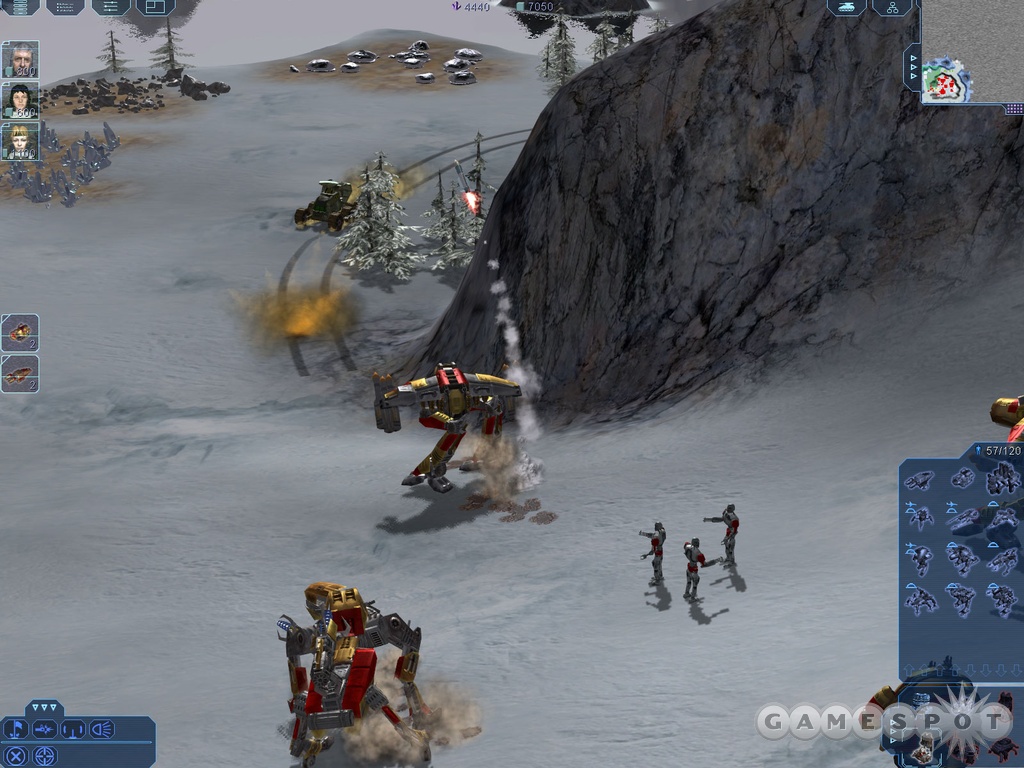Earth 2160 Q&A - Virtual Agents, Factions, and Gameplay
Producer Jeremy Ray gives us some further insight on this beautiful real-time strategy sequel.
Earth 2160 is scheduled to arrive early next month, and the third game in the Earth series promises to deliver more of the series' trademark real-time strategy gameplay along with a next-generation graphics engine. One of the cool aspects of the Earth games is that you can design your own units using technology you've researched, and this can result in a constant race to adapt to an enemy's tactics. But that's just one of the many aspects of Earth that make it different from conventional real-time strategy games. To get further details on the gameplay, we caught up with Midway's Jeremy Ray, the producer on Earth 2160.

GameSpot: In our time with the game, we noticed that only a few of the factions seem to be available in the single-player campaign? Does the campaign take place only from the perspective of two of the factions? Or will you eventually be able to play as all four factions in the single-player game?
Jeremy Ray: The four factions in Earth 2160 are the Eurasian Dynasty (ED), the Lunar Corporation (LC), the United Civilized States (UCS), and the aliens. You get to play as all four factions in the enormous single-player campaign. The third and fourth campaigns have not been shown yet and are unlocked as you finish campaigns. You can also play any of the factions right away in a skirmish or multiplayer game.
GS: Tell us about the resources in Earth 2160. There appear to be three types of resources in the game (water, metal, and crystal), but it seems that each faction uses only two of the three. What does it add to the game? Normally, in a real-time strategy game each faction would use the same resources.
JR: Yes water, metal, and crystal are the three resources in Earth 2160. The ED, LC, and UCS each use a different combination of two. The alien faction behaves a little different. Alien armies are really made up of two distinct groups. One of these groups uses only water, while the other group uses all three resources.
Having different resources, some shared and some not, between different factions can add some interesting strategy. For example, if you are playing the ED, who do not need crystal, how much focus should you spend guarding a crystal resource that only your enemy can use?
GS: Could you give details on the mercenary/hero units that you can recruit for each side? Who are these characters, and what can they do for you? And what will it cost to have them join you, and how often can you recruit them? Are they intended to be rare characters, or do you intend for players to have a mercenary or two in play at all times?
JR: These characters are called virtual agents in Earth 2160, and there are 12 in all. You can encounter a robot, computer virus, boy genius, smuggler, doctor, and a pilot, to name a few. Agents have their own personalities, weapons, and abilities, and some even have their own vehicles. An agent might be able to improve your resource gathering, decrease your research time, improve your razing, or help protect your existing army.
Virtual agents are available at specific times during the campaign or at random times during skirmish or multiplayer games. Agents will offer their services for a length of time in exchange for resources. You can also elect to fire an agent or not renew their contract, but an agent that is treated well will likely lower his or her fee. One of the things I find most interesting about virtual agents are the bidding wars that often result in multiplayer games. Popular agents can get bid up higher than their value; what exactly that price is depends on who you ask and what the current situation is. For those that don't like this element of randomness, you can turn off virtual agents in multiplayer.
GS: What are the preferred tactics and style of play for each of the factions? Which one is best for defense? Which faction is best for offense? Is there one that has better technology or that researches faster? What other unique abilities distinguish one from another?

JR: With a game as massive and diverse as Earth 2160, you are likely to get a lot of different answers for this question. It is almost easier to talk about what is similar between the factions rather than what is different. Each unit is not simply a different model or texture from another faction, like you see too often in other games. I guess the best thing to take from this is that there is no one best way to play any of the factions. That being said, here are a couple of my favorites from each of the factions.
I like the ballistic missiles for the ED. They take a long time to research, but you can wreak havoc with these guys on enemy structures. Think global thermonuclear war. The LC have ultimate rippers--large disc-shaped UFOs with a punishing energy beam. Again, they take a long time to research, and they are really slow to boot, but they can take a punch and sure can deal out the damage. The UCS have jaguars, probably my favorite unit on looks alone. It's fun watching a squad of these big, powerful mechs stomping a path to the enemy. Cue Ride of the Valkyries. Finally, the aliens have a couple of different aerial units that we want to keep a secret for now, but rest assured they are well worth the time and resources necessary for creation. Absolutely devastating, but only if you can stay alive long enough to get them up and running.
A Lot of Apollos
GS: When you research new technologies, do your units automatically upgrade while in the field, or do you have to send them back to base? For instance, if you research the next powerful shield or energy weapon, will that automatically show up on all the units you've already built? Or do you have to go use the unit designer? Are there any other interesting new functions in the unit designer tool you would care to discuss?

JR: You can research upgrades for different units that are either a replacement or an alternative. For example, if you have a unit that is equipped with conventional armor and you research a conventional armor upgrade, then all of your units will get that upgrade automatically.
One thing to keep in mind is that you can have many variations of the same unit that you get to customize. You might decide to have an Apollo 1 (you can customize the names of unit variations) set up with conventional armor, a sniper rifle, and a speed engine. Another customization could be an Apollo 2 with reflective armor, an antimissile system, a power engine, and a shield generator. Not only will these units look different, but they will behave very differently and be useful in different situations.
GS: Infantry are a new feature in Earth 2160, and so far it seems that infantry become outclassed in the game once you manage to research more-powerful units. You can upgrade infantry, but how important are foot soldiers in the later stages of the game? Can they keep up with vehicles?
JR: I think the various infantry units tend to be used more at the beginning because they are inexpensive and don't require a lot of research. That being said, I think they can be useful against even some of the superpowerful units. Most infantry cannot take the damage bigger units can dish out, but you can partially offset that with much greater numbers. Sometimes it helps to keep your infantry spread out. Your use of infantry probably depends on your playing style as much as anything.
GS: The game looks great, but what kind of system requirements will the game carry? How well does the game scale with computers that may or may not have the newest and best technology? And conversely, what kind of computer will you need to appreciate the game in all its visual glory, with all settings turned all the way up?
JR: Earth 2160 provides a large number of options for you to choose from to balance speed versus graphics quality. You'll need at least a 1.5GHz Pentium 4 or equivalent, 512MB of RAM, and a DirectX 9.0c-compatible video card with pixel shader 1.3 support.
GS: What are your postrelease support plans for Earth 2160? Do you envision lots of patches to tweak game balance, an expansion pack, or even an Earth 2170 sequel?
JR: Zuxxez, Reality Pump, and Midway plan on offering continued support for Earth 2160. In addition to official support there has been some interesting work by mod teams based off the European version. With the world editor tool included with the retail version, I expect we will see some really cool maps from the North American fans too.

The Earth series has been going on for a long time now, and I expect it will continue, but we have nothing official to announce now. Please check out the playable demo for a glimpse into the single-player campaign, and we hope to see you for some great multiplayer action online on EarthNet. Thank you for your time, and we hope you get the chance to enjoy Earth 2160, available November 8 at your favorite PC game retailer.
GS: Thanks, Jeremy
Got a news tip or want to contact us directly? Email news@gamespot.com
Join the conversation